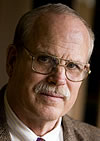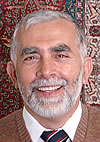Ramadan ended Sept. 10, but the controversy over the proposed Manhattan mosque that colored the Muslim month of fasting this year has not.
The mosque debate has sparked a good deal of general anti-Muslim sentiment in the United States, and the phenomenon appears to be growing, said University of St. Thomas theology professor Adil Ozdemir, a Muslim who teaches courses on Islam.
In an extreme example, U.S. leaders, including Gen. David Petraeus, were impelled to intervene in a Florida pastor’s planned “International Burn a Koran Day” to commemorate the anniversary of the Sept. 11 attacks. The pastor eventually called off his plans to burn 200 copies of the Quran.
“I can’t imagine anything that could hurt the Muslim world more than attacking the Quran and burning it,” Ozdemir said.
“Islamophobia,” as some term it, is evident locally, too. In St. Cloud, vandals painted “Go Home” across Muslim-owned businesses this summer, and, in another incident in December, a cartoon degrading the Muslim prophet Mohammed was tacked to electrical poles near a mosque and Somali-owned stores.
Yet, many prominent Catholics have taken public stances to fight anti-Muslim sentiment. On Sept. 7, Cardinal Theodore McCarrick, archbishop emeritus of Washington, D.C., and Father James Massa, executive director of the Secretariat of Ecumenical and Interreligious Affairs of the U.S. Conference of Catholic Bishops, joined with 32 other religious leaders to denounce “categorically the derision, misinformation and outright bigotry being directed against America’s Muslim community.”

From the church’s view
St. Thomas theology professor Terence Nichols hopes Muslims and Catholics can move toward mutual understanding and appreciation. Nichols and Ozdemir co-direct the Muslim-Christian Dialogue Center at St. Thomas.
In his office, Nichols keeps a drawing of a mosque and church in Damascus, Syria, that share a courtyard. For him, it’s a symbol of a history of cooperation between the faith and a sign of hope for Christian-Muslim dialogue, what he calls a “dialogue of life.”
Many Catholics are unaware of the church’s position on Islam, Nichols said. Part of the center’s work is explaining how the church understands its relationship with Islam.
According to the Second Vatican Council document on the Catholic Church’s relationship with non-Christian religions, “Nostra Aetate,” the church has “high regard” for Muslims.
“They worship God, who is one,” the document states. “Although not acknowledging him as God, they venerate Jesus as a prophet, his Virgin Mother they also honor, and even at times devoutly invoke. . . .” Vatican II called for Muslims and Catholics to forget past fighting and make a “sincere effort . . . to achieve mutual understanding.”
Popes John Paul II and Benedict XVI have also encouraged interreligious dialogue between the two faiths and visited mosques while traveling in predominantly Muslim countries. Benedict XVI reiterated the words of “Nostra Aetate” in 2005 while meeting with Muslims in Cologne, Germany.
“If the fundamental stance is that we worship the one God, that gives us a lot in common,” Nichols said. “It means that we’re believers, and we should stand up for one another. . . . Catholics need to know this.”

Moving beyond stereotypes
In May, the Islamic Center of Minnesota in Fridley celebrated its 40th anniversary. Archbishop John Nienstedt spoke at the celebration.
He emphasized that in order to achieve meaningful dialogue, both Christians and Muslims must be true to their own religions, and the conversation must begin with what they share in common, not with disagreement.
“It is essential to move beyond our own stereotypes and prejudices, to put aside our dislikes and memories of wrongs, and approach our fellow participants in dialogue with genuine love,” Archbishop Nienstedt said.
Like Christians, Muslims also need to learn more about Christian-Muslim dialogue, Ozdemir said. They, too, have to move past negative stereotypes of Christians, he said. “There are Muslims who are eager to pursue dialogue, but there are [also] those who are unhappy with the dialogue,” he said. “We need to teach our co-religionists.”
The goals of dialogue
There is a distinction between “Christian-Muslim” dialogue and “Catholic-Muslim” dialogue, Nichols said.
“You have to distinguish what kinds of Christians and what kinds of Muslims you’re talking about,” he said. “There are some Christians who hate Islam, and some Muslims who don’t seem to like Christianity, and they think of each other as enemies. . . . With those groups, there is no dialogue. There’s only polemics.”
When St. Thomas’ Muslim-Christian Dialogue Center started in 2007, its goal was to foster genuine dialogue, which includes speaking with people who don’t think as Nichols and Ozdemir do, Nichols said. The center organizes speakers and events designed to bring Christians and Muslims together.
Other Twin Cities groups, including some Catholic parishes like Pax Christi in Eden Prairie, have also embraced interreligious dialogue, Nichols added.
As “Nostra Aetate” states, the goal of Christian-Muslim dialogue is “mutual understanding.” This includes welcome, appreciation and tolerance, Ozdemir said.
The two faiths can also learn to live their own faith better through understanding the other, Nichols said. Muslims, for example, pray five times a day, like Catholic religious do in the Liturgy of the Hours. Lay Catholics can learn something from Muslims’ commitment to daily prayer, he said.
Standing before a classroom of 20 theology students Sept. 14, Ozdemir lectured on the tenets of Islam, writing basic terms on the chalkboard.
One of the meanings of the word “Islam” is peace, because a person can only find peace in God, he told them.
Most of the students who take his class are not Muslim, Ozdemir said. They profess to be Christian or agnostic or searching. Some are interested in Islam because of its prominence in international politics. Others want to understand the religion for themselves.
Those who think violence is at the core of Islam misunderstand the religion, Ozdemir said. “Identifying Islam with violence is devoid of any scholarly . . . justification,” he said. “Islam is anti-violence.”
Yet, the misconception perseveres. Some point to verses in the Quran that seem to justify, or even call for, violence against non-Muslims.
However, like the Bible, the Quran needs to be read in context, which is best done by scholars, Ozdemir said. Although Islam lacks a Magisterium, or teaching authority, like the Catholic Church, it does have a long legacy of scholars who guide Muslims in Quran interpretation.
“These quick conclusions and literal reading are themselves very problematic,” he said.
Mirroring Catholic prejudice
In the winter 2009-2010 issue of Notre Dame Magazine, history professor R. Scott Appleby argued in the article “The Differences Are Similar” that American Catholics should be able to sympathize with Muslim-Americans.
In the 19th century, Catholic immigrants were accused — like Muslims today — of wearing strange religious garb, treating women poorly and seeking “worldwide domination.”
The comparison is apt, although the accusations themselves are inaccurate, Nichols said.
“I think it helps Catholics understand the position of Muslims today because we went through something similar in the 19th century,” he said.
“Groups were strongly opposed to Catholic immigrants and to the building of Catholic churches.”
Like America’s Victorian-era Catholic prejudice, today’s Islamic prejudice stems from more than a fear of immigration, Ozdemir said. However, it obviously has roots in the fear of extremist violence evidenced in the Middle East.
“I don’t think most Americans know much about Islamic religion,” Nichols said. “I think it’s mostly as association
. . . with terrorism, and the generalization of that. After all, we’re at war with two Islamic countries.”
Americans cast the same pall of suspicion over Germans during World War I and II, and the Japanese after Pearl Harbor, going so far as to move Japanese Americans to internment camps, Nichols added.
“This distortion of Islam is the cause of fear,” Ozdemir said.
Muslims in America
Ozdemir remembers the first time he saw the U.S. Capitol and read its inscriptions describing the nation’s values. “It was as if I were reading verses from the Quran,” he told his traveling companion.
“They’re so similar. This is why Muslims are more at home in America than anywhere else — because America is championing liberties, freedoms, democracy and human rights.
“Your ideals are our ideals,” he added. “To build a better community, a just community, a peaceful community is a goal of Muslims, as it’s a goal of Christians and Americans.”
To say that Muslim ideals oppose those of the United States is a distortion of the faith, he added.
Muslims and Catholics share many of the same criticisms of modern American society, Nichols added, listing consumerism, promiscuity and racism.
“There’s the possibility of a rich dialogue between Catholics and Muslims on areas of social thought,” he said.
Yet, many Americans choose not to see similarities. Unlike many European countries, America identifies itself as a Christian nation. Many European countries view Islam as a threat to secularization, while America tends to view Islam as a threat to its Judeo-Christian foundation and, thus, its national identity.
Americans tend to inflate Christianity with national self-interests, Nichols said, adding that the temptation to do so is “extremely dangerous.”
“You might almost say the No. 1 temptation to idolatry is to say our nation and God’s will are the same,” he said.
Although some Americans fear Muslims will impose Shariah, or Islamic law, upon America, this fear is unfounded, Ozdemir said.
“Such accusations are not very different from the accusations once raised against Catholics that they would bring theocracy and put America under the pope or against Jews who would apply the Jewish law,”? he said.
“[Shariah] guarantees freedoms of life, progeny, reason, religion and property,”?he added. “It reflects the will of God, which is justice. It cannot be forced against the will and free choice of people without itself being violated.”
Despite the challenges, America’s interest in religion means that Christian-Muslim dialogue could be more fruitful here than in Europe, Ozdemir said.
And, Nichols added, there are exciting possibilities for the future of the dialogue.



